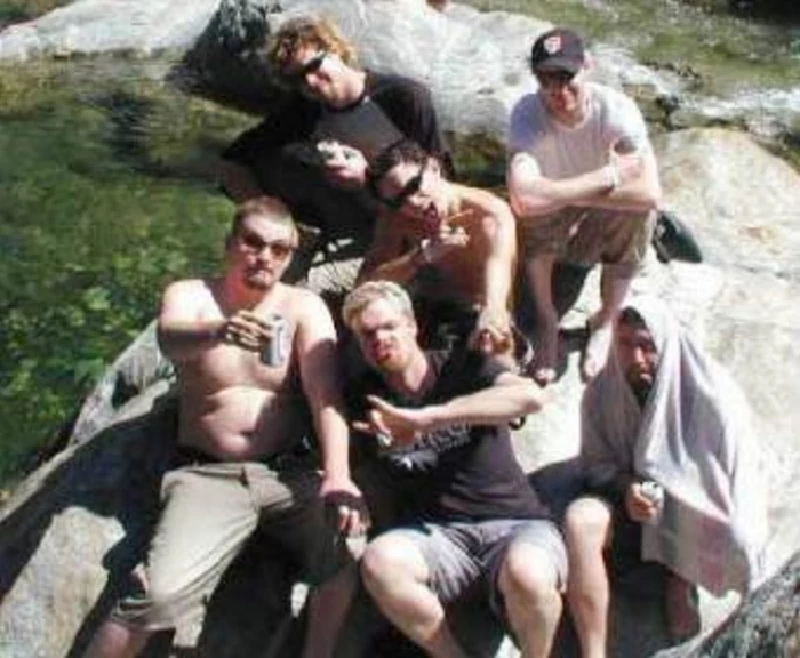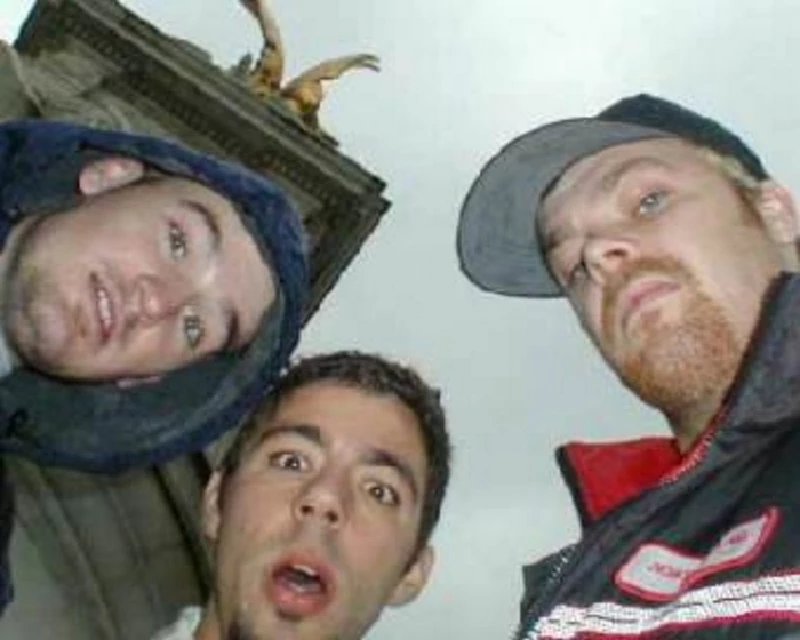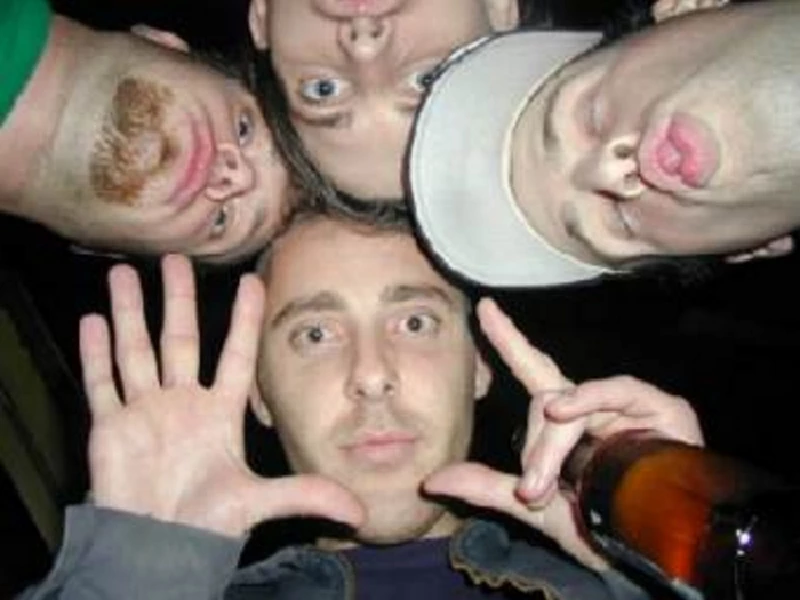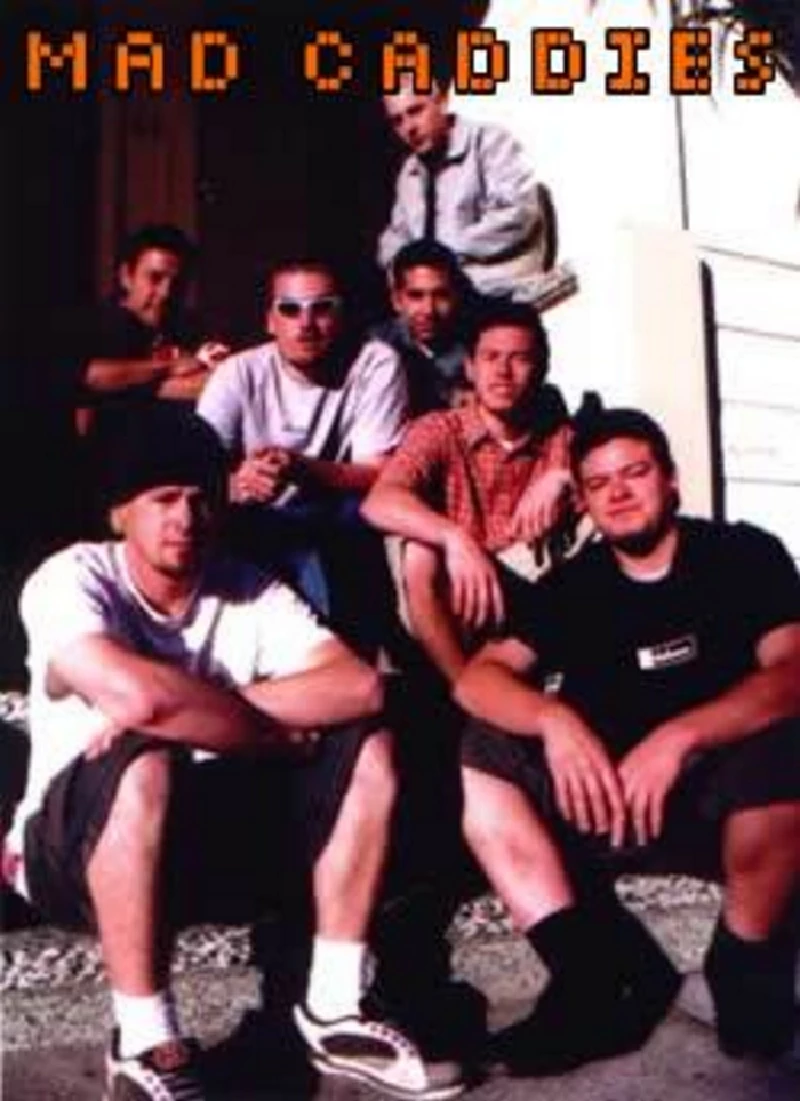Jinxed - Interview
by Anastasia Grabov
published: 12 / 5 / 2003

intro
Increasingly prolific, California's the Mad Caddies perceive their music to be an intriguing blend of punk rock, reggae, Dixieland jazz, and ska. Ana Grabov chats to Mark Iverson backstage at the London Astoria about their new album
In 1920's America alcohol was illegal. Despite this speakeasy bars thrived. Alcohol was supplied by gangsters, police were easily bribed and the jazz loving public would dance to the likes of Louis Armstrong well into the night. Most of us share little connection with the era but this is just one of the more prominent themes that have got themselves entangled in the image of Santa Barbara's the Mad Caddies. Not ones to follow the well trodden paths of unrequited love, growing up and rebellion, lead singer Chuck Robertson, and the rest of the Mad Caddies seem to be on a mission to explore every type of music going and to mix it into the core of their own style, which they perceive to be a blend of punk rock, reggae, Dixieland jazz, and ska. This diversity has made it hard to put them into a box. They do have the obligatory trumpet and trombone players and though they have frequently been compared to US ska punks Edna's Goldfish -who sing about unrequited love, growing up and rebellion- they refuse to accept themselves as a ska band. This is perhaps unsurprising when their influences are as diverse as Manu Chao, Faith No More, the Clash, Pantera and Alice in Chains. The use of their imaginations would also have been one of the things that led Nofx's Fat Mike to sign the band onto his Fat Wreck Chords Label and send them on the 1997 Warped Tour. Their most successful album so far has to be the 1998 'Duck and Cover', which bought them into the spotlight of the punk rock world and won them fans all over the globe. Since then the band has changed their line-up several times and continued to experiment with different ideas. Much to the surprise of the band the 2001 album 'Rock the Plank', inspired many of the fans to wear eye- patches and black pirate hats to gigs. I went to meet the Mad Caddies at the London Astoria in April, and even then I could see several fans in various pirate attire. I spoke to Mark Iverson, the Mad Caddies' bassist about their new album, and what else to expect from the boys in the future. It all went a little something like this: PB : The tour is all about promoting your new album, 'Just One More'. You have said that you wanted the new album to sound "like 'Duck and Cover' on massive amounts of steroids."Do you think it lives up to that? MI : Yeah I do. I think we tried to do this one kind of taking off were we left off from last time , but a couple of years later on ,and with a more mature take on it. It is a little bit more diverse. PB : Who did you chose to produce it? MI : Half was done with Ryan Green in San Francisco. He produced it with us up there. The other half with Angus Cooke. PB : Why? Have they done any of your other albums? MI : Angus did the first three and half of the fourth one, and Ryan Green did the other half. We like getting different sounds from different studios so we can mix and match. PB : With your expectations do you think it was harder or easier to do than your other albums? MI : Well easier because I think we all had took part in the writing process, all got along and saw eye to eye when it came to the songs. PB : Why did you choose 'Just One More' as the title? MI : Everyone thinks its going to be like our last record, a secret sign. It was actually a sign on the exit of a bar that we all go to. PB : In your other album, 'Rock the Plank', you adopted a pirate theme, and track 2 on your new one is called 'Contraband'. Is that going to be a recurring theme for you? MI : The whole pirate thing was actually only one song. We did another one for 'Rock the Plank' that never actually got on the record.It was the kind of thing that wasn't supposed to get that important. PB : Why did you chose the pirate theme? MI : Our drummer, Brian Flennoken, is really big into pirates. He wrote one kind of like pirate song and it just seemed to be the best thing for the time. There was nothing really beyond that. It was definitely for the moment. PB : Did you go on tour for 'Rock the Plank'? MI : Yeah, we actually toured more than we ever did. It came out in May 2001 and we did Japan, Australia, New Zealand, Europe a couple of times and a stage tour as well. PB : You've been to Europe a couple of times before then? MI : This is actually our seventh time! PB : How do you think it's going so far, this time round? MI : Pretty well, the crowds have been great, and there has been no problems so far. PB : Have you got any favourite venues in Europe and the UK? MI : I really like TJ's in Newport, , but I think as far as London goes, I like the Astoria a lot. I used to come over here when I was at school, in the summer and stuff. I saw Rocket from the Crypt here. I'd say this is my favourite venue. PB : You used to come here before you were in the band? MI : Yeah, I used to just like save up money when I was at school. We cameand stayed with friends and went to the Astoria. PB : What are you looking forward to the most during this tour ? MI : Better crowds, better treatment, more food... [The table in front of us contains little food, just a big slab of cheese and some bread- most of the table is covered in various alcoholic beverages] PB : More food? There's not enough cheese then. MI : Yeah, bread and cheese is better than in the States. Generally though much better. The crowds in European cities are always better than in the States. PB : Have you found that you fan base differs in appearance in different countries? MI : Yeah, France and Italy are definitely a little more manic, a little more.. I hate to use the word crazy. They're more intense I guess. PB : Now that you're playing most nights, what do you do whilst you're touring? MI : A lot of drinking, movies on the bus, walk around if we can. It always depends on where the show is. Sometimes there's not much around, just gas stations. PB : Do people recognise you when you walk around? MI : Here and there. PB : I heard that Keith Douglas, your trumpet player, lost his two front teeth a little while back. Is that true? MI : It's true! He actually got drunk, and fell down some stairs. PB : Can he still play the trumpet? MI : Yes, he has fake teeth, caps on the tops of his teeth. He's fine now but he's got to be careful. They're temporary. PB : So, his whole teeth fell out? MI : No, just the bottom half of the two front ones. PB : Does that make a different sound when he plays the trumpet ? MI: He had to wait until he had the emergency surgery. It was like $5000. He was off for at least a month. PB : Is he going to have the caps put back on ? MI : I think so, I'm not exactly sure. What he has now will suffice him until then. PB : Do you know what encouraged him to play the trumpet ? MI : He's been playing since he was like in grade school, 13 or 14. PB : Was that because of his parents? MI : You know, he really picked it up because in the States, in sixth grade, when you're round about 10 or 11, you have to pick up an instrument and play it for a year. He chose the trumpet. I didn't play trumpet. I think he just picked it up because he was a big jazz fan. He played in the school band. He's great though. He's been playing for 13, 14 years. He's probably the most musically trained person in the band. PB : Is that the same with your trombonist Ed Hernandez,. Is that why he plays the trombone ? MI : Ed just started playing literally less than a year before the band started. The band started in 1995, and he's just picked it up the year before, just for the hell of it. He learned it really quickly. When we started playing he got really good really quickly. PB : So, are you all into jazz? MI : Yeah! I mean, the guy who bought that element into the band was Sascha Lazor, our guitar player . I think actually it was the Squirrel Nut Zippers. They were from the East coast in the States. They kind of have a Dixieland sound. So, anyway, Sascha was into the older type of jazz, like Louis Armstrong and then I got into it. We all have different tastes in music. There's a lot of older jazz that we all listen to and have a mutual appreciation for. PB : Was it more then that you were influenced by each other? MI : For me yeah. Sascha was the guy that turned me onto that kind of stuff. We all just picked it up through him. Maybe with Keith as the exception, I don't think any of us were really into jazz as we grew up. Sascha was responsible for all that.. PB : You've always mixed ska with lots of different styles in the past. Is there anything you still want to try out? MI : Tonnes of things. I don't actually see us as a ska band. When we started out we liked the majority of the songs on our first record. We liked the horn section more, so it ended up sounding like a typical ska band. It then meant we got more jazz into it. Using the horns we had, like a belly- dancing song which we had on the last record, and some country stuff. We had some songs that sounded like Italian funeral music, and really, really diverse stuff. We all listen to... I wouldn't say weird, but diverse genres of music. That's all, hopefully, come together and forms, kind of a mesh of different styles. But yeah, there's tonnes of stuff we wanna do. Every combination possible. Dixieland, funeral music, Italian songs, everything. PB : Is Dixieland a place? MI : Dixie is like the south- Mississippi or Louisiana. That kind of music came out in the 1920's and 30's. It's old jazz. Kind of where jazz came from. PB : So, you've been together for about 8 years now. MI : 8 years this August, yeah! PB : There's been a lot of changes in your band. Why do you think this is? MI : We had one guitar player leave a couple of years ago. The only original guys are myself, Sascha, and Chuck. The horn players came in 2 months later, but Brian is our fourth drummer and we had 2 other trumpet players before Keith. He came in right after the first record. He was on the first tour in ˜97. So, I dunno, for some reason it's been drummers. It's hard to get a group of people who all get along. Iit really is. Someone's going to end up clashing with someone. I've had problems with people in the past, and vice versa. This is the first time really in eight years when we actually all get along. It just took that amount of time to get everyone who didn't see eye to eye, or didn't get along flushed out of the system. It's great that so much later it finally works now. PB : You think it's going to stay like that then? M I: We hope so. PB : Do you all write songs together or does someone come up with the basics? MI : Sascha and Chuck usually come up with the initial chords for the songs. Sascha writes all of the Dixieland tunes, and other weird stuff. Chuck does a lot of straight-edge punk stuff, and a lot of reggae songs but usually it's one of the two guys throwing out an idea, usually just a riff or something really short. Then we're all in there; someone adds their piece there and someone wants to write it like that. Then we just all experiment with the sound, and everyone gives their 2 cents. It just becomes a collaborative from then on. PB: So, everyone puts something into it? MI : Yea there's no actual parts that we have to do. In the end everyone's given their opinion. PB : Do you think that you, Chuck and Sascha, the original members, dictate the direction the band takes? MI : I'd like to think we're more of a Democracy, and definitely from that angle of making decisions it's down to Sascha and Chuck, which is fine. I mean there's no egos involved in this band. We all have other people involved as far as things such as management, accounts and special technicalities are concerned. It's up to them. It's pretty much a democracy apart from anything else. PB: So now that you've got the outline sorted, can you see the band staying together for another 8 years ? MI : I don't know. I couldn't even see myself doing this for one year. I was at college in California when we started out. We practised at Chuck's parent's house. It was like, something to do before school started. You know, ˜let's play in a band, and in four years we'll be in England". It wasn't even a consideration when we started. But, I dunno, the hard part would be having to make that decision whether to stay or not because of financial reasons. This is technically our job, and your job is like your occupation. If it can't pay the rent, and pay the bills, something's wrong. I mean, I dunno, I'd like to be able to do it as long as we can live comfortably, not necessarily below what is comfortable. So long as I can live off what I'm doing, I'll stick around. PB : Do you think any of you are going to move onto things such as production or other music related careers? MI : I think our drummer, Brian, might. Sascha probably would. Probably those two. PB : You don't think you will? MI: No. In fact, when this band's done I'm probably not going to be in another band. This is the only band I really want to be in. PB : What do you think it takes to last as long as bands such Snuff and Nofx have done? MI : The right combination of people, a lot of luck- not discounting anyone's talent. I mean a lot of right-place-right-time. You know, Nofx got big when it was a good time to get big. Snuff- not as big, but definitely had the quality. They been round a long time. But yeah, a combination of luck and chemistry. PB: Last question- do you think you've got this combination? MI : I think so because a group like us, we've been together for so long. We're pretty much in tune with ourselves. There's definitely been some ups and downs. Some pretty severe ones in fact too. With all that we've been through so far I like to think we do, yeah. PB: Thanks a lot.
Picture Gallery:-



most viewed articles
current edition
Carl Ewens - David Bowie 1964 to 1982 On Track: Every Album, Every SongArmory Show - Interview with Richard Jobson
John McKay - Interview
Colin Blunstone - Thalia Hall, Chicago, 16/7/2025
Billie Eilish - O2 Arena, London, 10/7/2025
Bathers - Photoscapes 1
Visor Fest - Valencia, Spain, 26/9/2025...27/9/2025
Loft - Interview
Sir Tim Rice - Interview
Robert Forster - Interview
previous editions
Manic Street Preachers - (Gig of a Lifetime) Millennium Stadium, Cardiff, December 1999Heavenly - P.U.N.K. Girl EP
Beautiful South - Ten Songs That Made Me Love...
Peter Perrett - In Dreams Begin Responsibilities Interview Part One
Boomtown Rats - Ten Songs That Made Me Love....
Oasis - Oasis, Earl's Court, London, 1995
Trudie Myerscough-Harris - Interview
Coldplay - Wembley Arena. London, 16/8/2022
Prolapse - Interview
Pixies - Ten Songs That Made Me Love...
most viewed reviews
current edition
Davey Woodward - Mumbo in the JumboSick Man of Europe - The Sick Man of Europe
Lucy Spraggan - Other Sides of the Moon
Phew, Erika Kobayashi,, Dieter Moebius - Radium Girls
Suzanne Vega - Flying With Angels
Amy Macdonald - Is This What You've Been Waiting For?
Bush - I Beat Loneliness
Blueboy - 2
Alice Cooper - The Revenge of Alice Cooper
Cynthia Erivo - I Forgive You
Pennyblackmusic Regular Contributors
Adrian Janes
Amanda J. Window
Andrew Twambley
Anthony Dhanendran
Benjamin Howarth
Cila Warncke
Daniel Cressey
Darren Aston
Dastardly
Dave Goodwin
Denzil Watson
Dominic B. Simpson
Eoghan Lyng
Fiona Hutchings
Harry Sherriff
Helen Tipping
Jamie Rowland
John Clarkson
Julie Cruickshank
Kimberly Bright
Lisa Torem
Maarten Schiethart